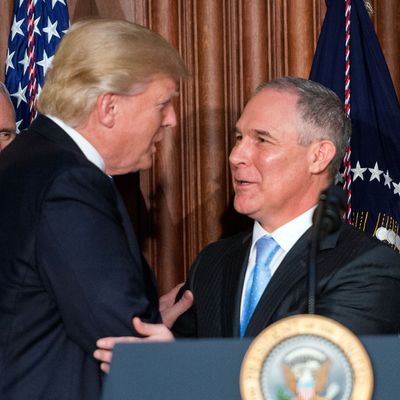
The GOP is the only major party in the developed world that does not recognize the reality of manmade climate change. And since the Republican Party happens to enjoy significant influence in the world’s most powerful country, the entire international community has been forced to accommodate its superstitions.
When 195 nations came together to draft the Paris Agreement on climate change in 2015, the United States refused to allow any legally binding language into the text — because if the agreement were legally binding, then Barack Obama would have had to submit it to the Senate for ratification and Republicans would have danced on the deal’s grave.
In the view of most international diplomats, the Paris agreement has only one binding requirement: Each nation must publish an emissions reduction target, and draft reports explaining how it is meeting those targets. But the target itself is up to each nation’s government — and can be changed at any time. Obama pledged to cut America’s carbon pollution 26 percent from 2005 levels by 2025. President Trump could pledge to cut them by a sum that would require no significant government intervention. Market forces alone are already phasing out coal and propelling the growth of wind and solar power, anyhow.
So the Trump administration has little to gain by withdrawing from the Paris agreement. It does, however, have much to lose — including America’s credibility as a world leader and an upholder of its international commitments. What’s more, once the rest of the world no longer has to worry about the Republican Party it could, theoretically, give the agreement more teeth — including rules aimed at punishing nations that refuse to participate in the deal.
“Legally and economically, the United States would be much more vulnerable outside of Paris than in,” one European official told Politico this week. “Being outside a major multilateral environmental agreement like the Paris agreement leaves a country more vulnerable to trade-related measures from countries that are inside the agreement.”
The Paris agreement binds every significant country on planet Earth, on an issue of existential importance. It’s hard to imagine a better way for the U.S. to marginalize itself than forfeiting its seat at that table.
And yet, the White House appears poised to do just that:
President Donald Trump may pull the United States out of the Paris Agreement on climate change as early as next week, sources with knowledge of the plans told HuffPost on Tuesday … White House lawyers drafted a memo following a meeting last Thursday that argued that the administration could face legal blowback in U.S. courts if it moves to weaken the country’s emissions goals under the agreement. White House advisers convened lawyers from the Department of Justice, EPA and State Department on Monday to discuss the legal arguments.
The case for withdrawal centers on a single line in the agreement, according to Politico and the Huffington Post: “A party may at any time adjust its existing nationally determined contribution [NDC] with a view to enhancing its level of ambition.”
White House counsel Don McGahn and EPA director Scott Pruitt believe that this gives countries the freedom to tighten emissions limits, but not to relax them — or, at least, that environmental groups and American judges could interpret the line that way, and create a bunch of legal headaches for the administration.
The Sierra Club, for one, disagrees. In a recent internal memo obtained by Politico, the environmental group concludes, “it would be extremely difficult to prevail on the merits” in any legal challenge against the administration’s right to weaken America’s domestic climate pledge.
Secretary of State Rex Tillerson and the State Department’s lawyers reportedly share this assessment. Which isn’t too surprising, given that American diplomats will bear the brunt of the blowback should the U.S. withdraw from the deal.
But Steve Bannon and Pruitt want out. And some White House lawyers think they may have a point. The president has said that he will make a final decision on the agreement in the next two weeks.






























